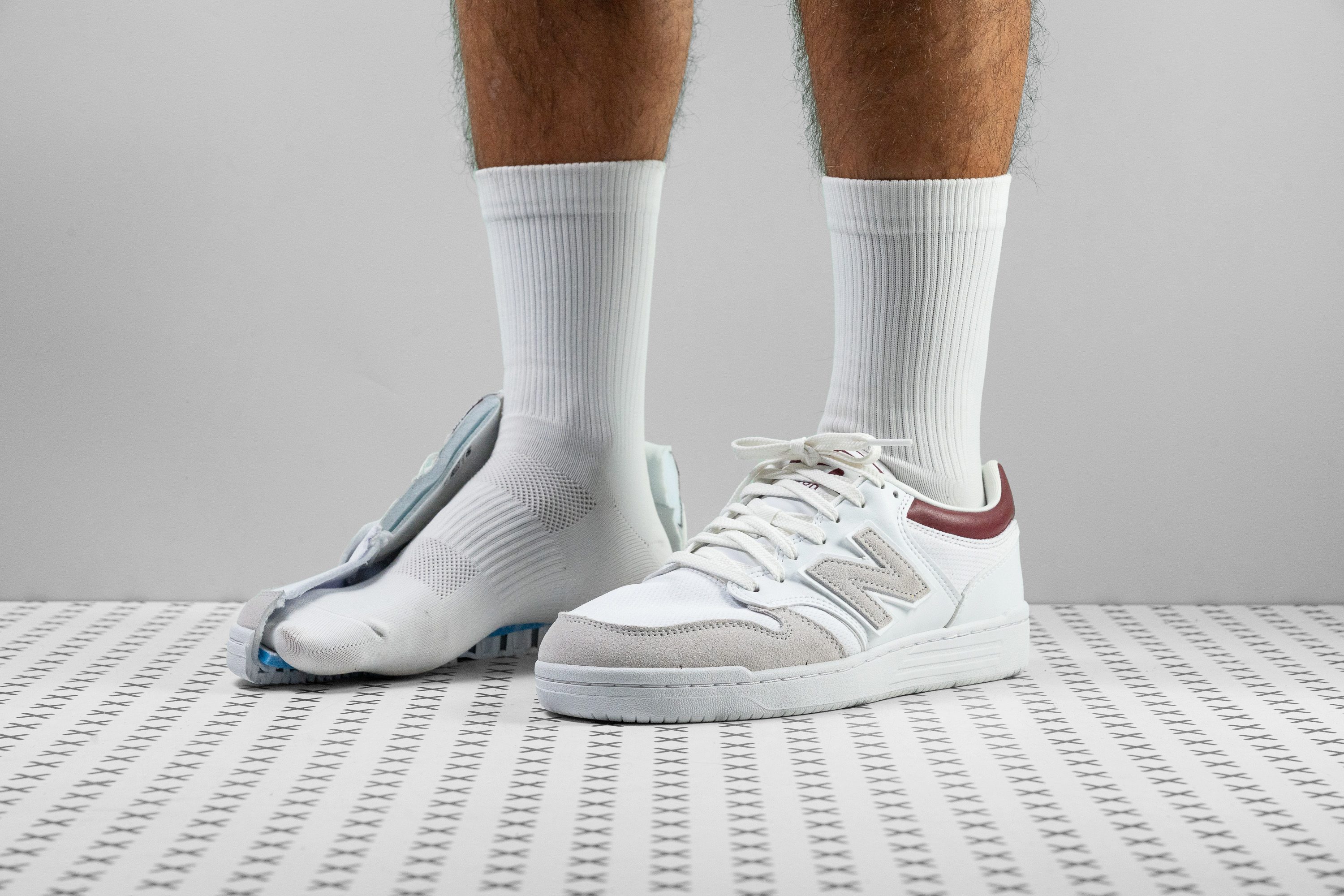Our verdict
- Top pick in best basketball sneakers (2024)
- Top pick in best leather sneakers (2024)
Pros
- Luxuriously padded and comfortable
- Protective cushioning
- Feels stable and supportive
- Excellent for all-day use
- Great traction
- Foot slides smoothly in and out
- Zero break-in required
- Accommodates wide feet
- Dope retro vibe
- Easy to clean and keep clean
- Budget-friendly
Cons
- Leather isn't genuine and lacks quality
- Durability could be better
Audience verdict
- Top 24% most popular sneakers
Comparison
The most similar sneakers compared
+ + Add a shoe | |||||
|---|---|---|---|---|---|
| Audience score | 89 Good! | 89 Good! | 94 Superb! | 93 Great! | |
| Price | $90 | $80 | $110 | $90 | |
| Style | RetroSportyMinimalist | RetroSportyMinimalist | RetroSporty | ClassicSportyMinimalist | |
| Shock absorption | Low | Low | - | Moderate | |
| Energy return | Moderate | Low | - | Moderate | |
| Traction | High | Low | - | High | |
| Breathability | Moderate | Breathable | Moderate | Moderate | |
| Weight lab | 13.9 oz / 395g | 12.9 oz / 366g | 16.4 oz / 465g | 14.1 oz / 401g | |
| Size | True to size | True to size | True to size | Half size large | |
| Midsole softness | - | - | Balanced | - | |
| Material | Leather | LeatherVulc Sole | Leather | Cup SoleLeather | |
| Season | SpringFall | Summer | SpringFall | SpringFall | |
| Inspired from | Basketball | Basketball | Basketball | Basketball | |
| Width / fit | Narrow | Medium | Medium | Medium | |
| Toebox width | Narrow | Medium | Medium | Narrow | |
| Leather/suede quality | Fake leather | - | Real leather | Real leather | |
| Toebox durability | Bad | Good | Good | Good | |
| Heel padding durability | Bad | Decent | Decent | Bad | |
| Outsole durability | Good | Decent | Decent | Decent | |
| Heel stack lab | 26.7 mm | 21.1 mm | 27.0 mm | 26.8 mm | |
| Stiffness | Moderate | Moderate | Stiff | Flexible | |
| Tongue padding | Average | Average | Average | Average | |
| Drop lab | 11.4 mm | 10.0 mm | 12.5 mm | 13.2 mm | |
| Forefoot | 15.3 mm | 11.1 mm | 14.5 mm | 13.6 mm | |
| Removable insole | ✓ | ✓ | ✓ | ✓ | |
| Heel tab | None | None | None | None | |
| Torsional rigidity | Flexible | Flexible | Moderate | Moderate | |
| Heel counter stiffness | Flexible | Stiff | Stiff | Stiff | |
| Sustainable | ✗ | ✗ | ✗ | ✓ | |
| Closure | Laces | Laces | LacesVelcro | Laces | |
| Top | Low top | Low top | Low top | Low top | |
| Ranking | #94 Bottom 22% | #88 Bottom 27% | #20 Top 17% | #24 Top 20% | |
| Popularity | #28 Top 24% | #38 Top 32% | #63 Bottom 47% | #35 Top 29% |
Who should buy
We recommend the New Balance 480 as a great choice for:
- Those in the market for a well-padded shoe that’s superbly comfortable for all-day wear
- Sneakerheads looking for a shoe that has a sleek retro vibe
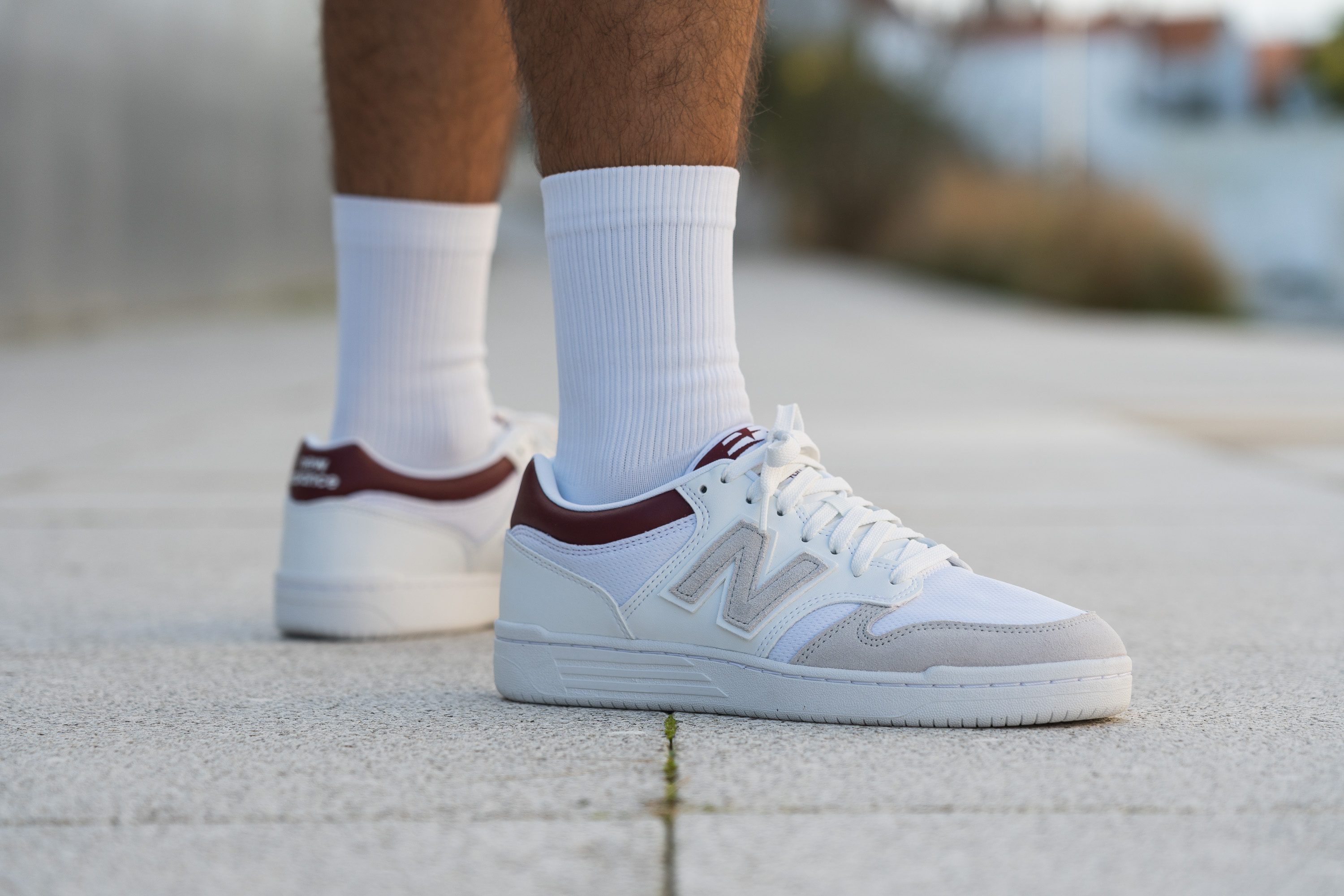
Who should NOT buy
The 480 might feel a little too cheap for some people. The Adidas Spezial offers a much more high-quality and durable construction made almost entirely of genuine suede, making it a much better bang for the buck.
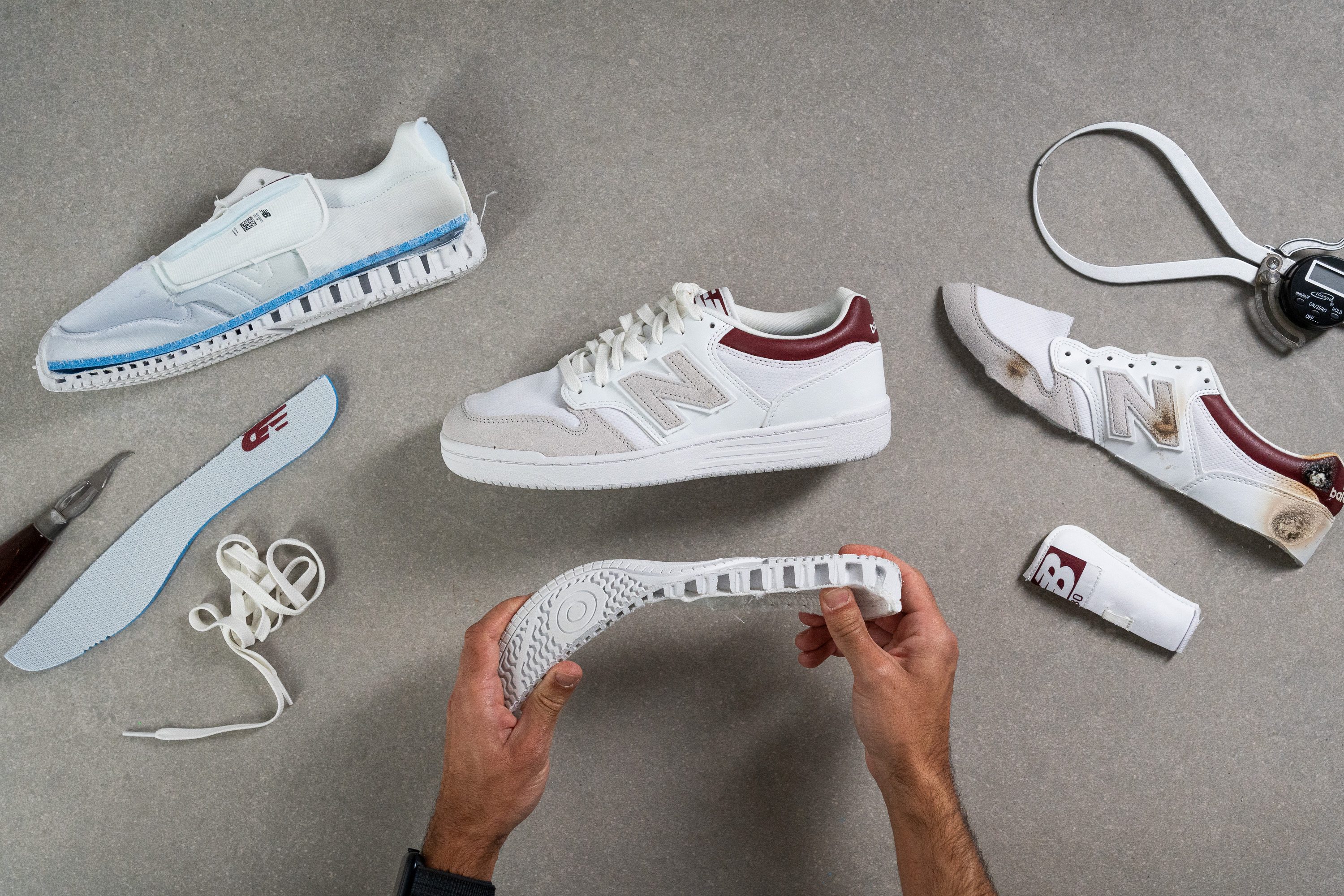
Cushioning
Shock absorption
The New Balance 480 features an old-school rubber-based sole and no foam to attenuate the impact.
It's not completely dull because the hollow sections allow for some midsole compression. But it doesn't offer much cushioning either, as the shoe's shock absorption clocked in at only 60 SA.
So, not a top choice for all-day wear if you seek impact protection and reduced load in the joints.

| 480 | 60 SA |
| Average | 89 SA |
Energy return
The 480 is a low-rebound minimalist sneaker that doesn't feel springy or bouncy at all. Showing a minimal energy return of 47%, it has a very static and grounded kind of ride.
| 480 | 47.3% |
| Average | 50.2% |
Heel stack
Using our caliper, we measured the 480’s stack to be 26.8 mm thick at the heel which is a little shorter than our current lab average.
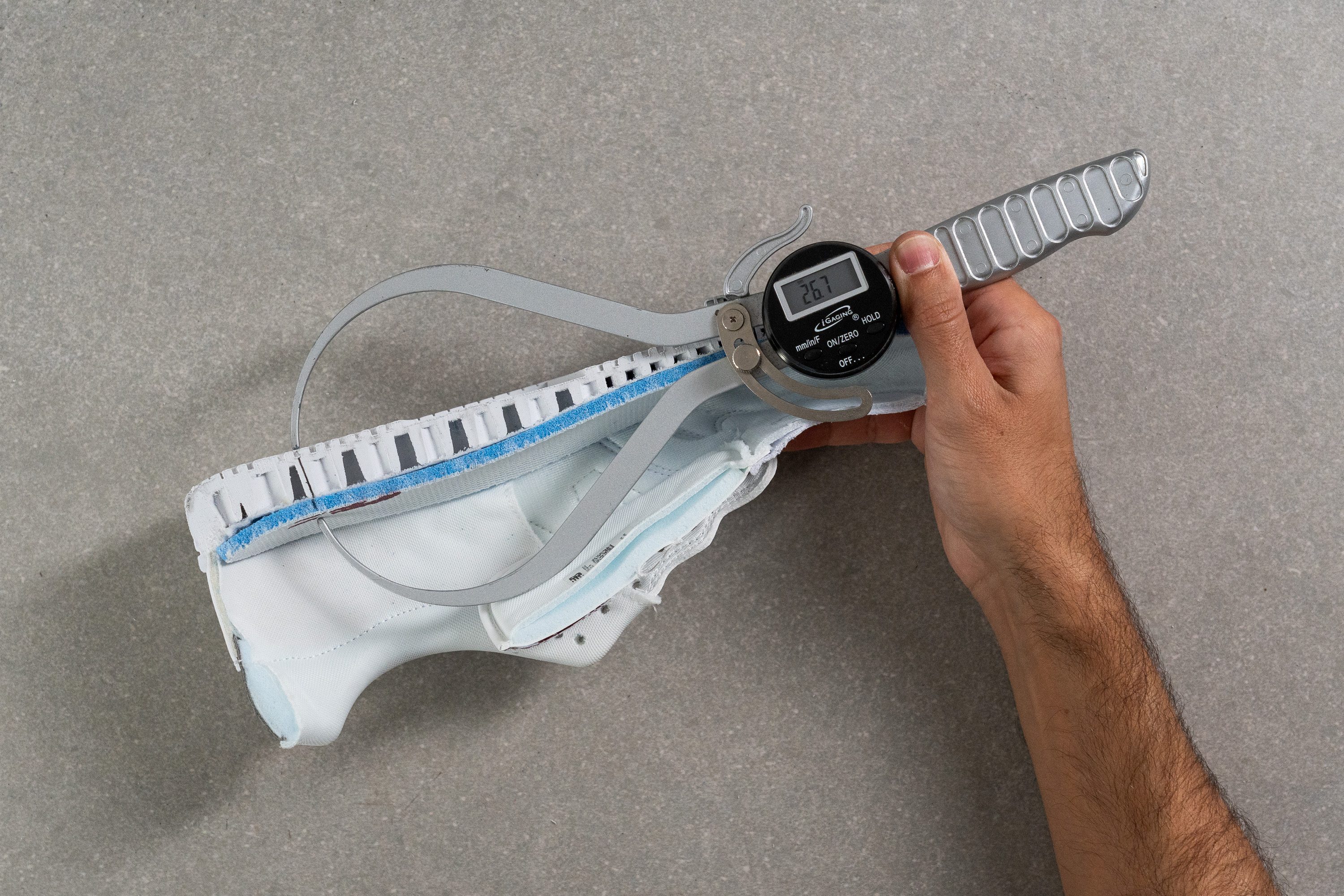
However, this is still an adequate amount of protective rubber underfoot, with the cutout sections allowing the shoe to compress under our weight and provide excellent impact dampening as we go about our day.
| 480 | 26.7 mm |
| Average | 30.7 mm |
Forefoot stack
Moving up to the forefoot, we found that the 480’s stack is also shorter than average at only 15.3 mm thick.
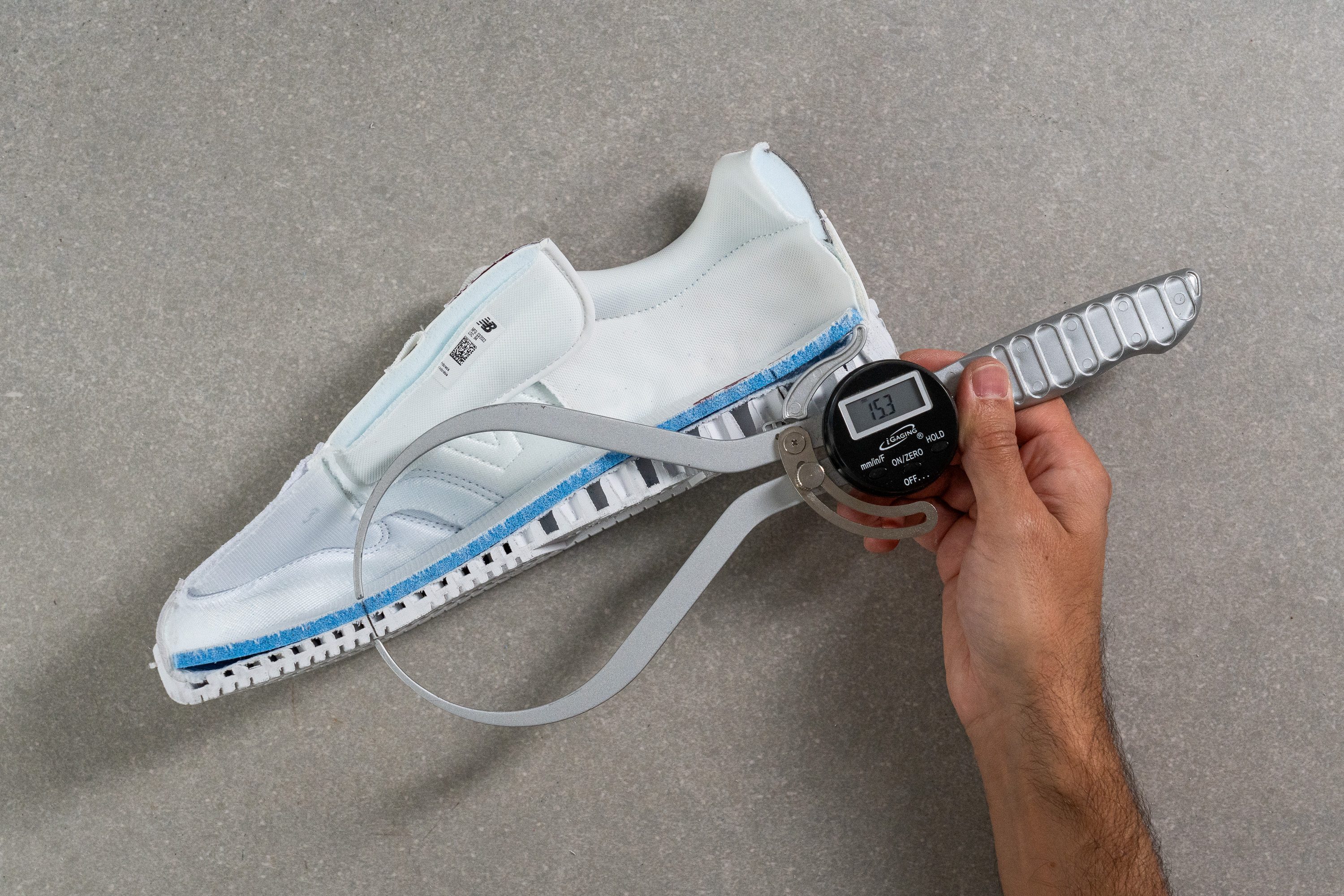
Having such a low stack not only feels quite natural underfoot but also means that we felt incredibly stable in this shoe. This not only makes the 480 a good walking-around kick but also means that we were comfortably able to take on mild fitness activities or do some lifting in this shoe.
| 480 | 15.3 mm |
| Average | 19.5 mm |
Drop
The difference in our stack measurements leaves the 480 with a heel drop of 11.8 mm, which is right on par with our current lab average. This offset means that we have a good amount of material at the heel to dampen our landings while providing a lot of ground feel at the forefoot.
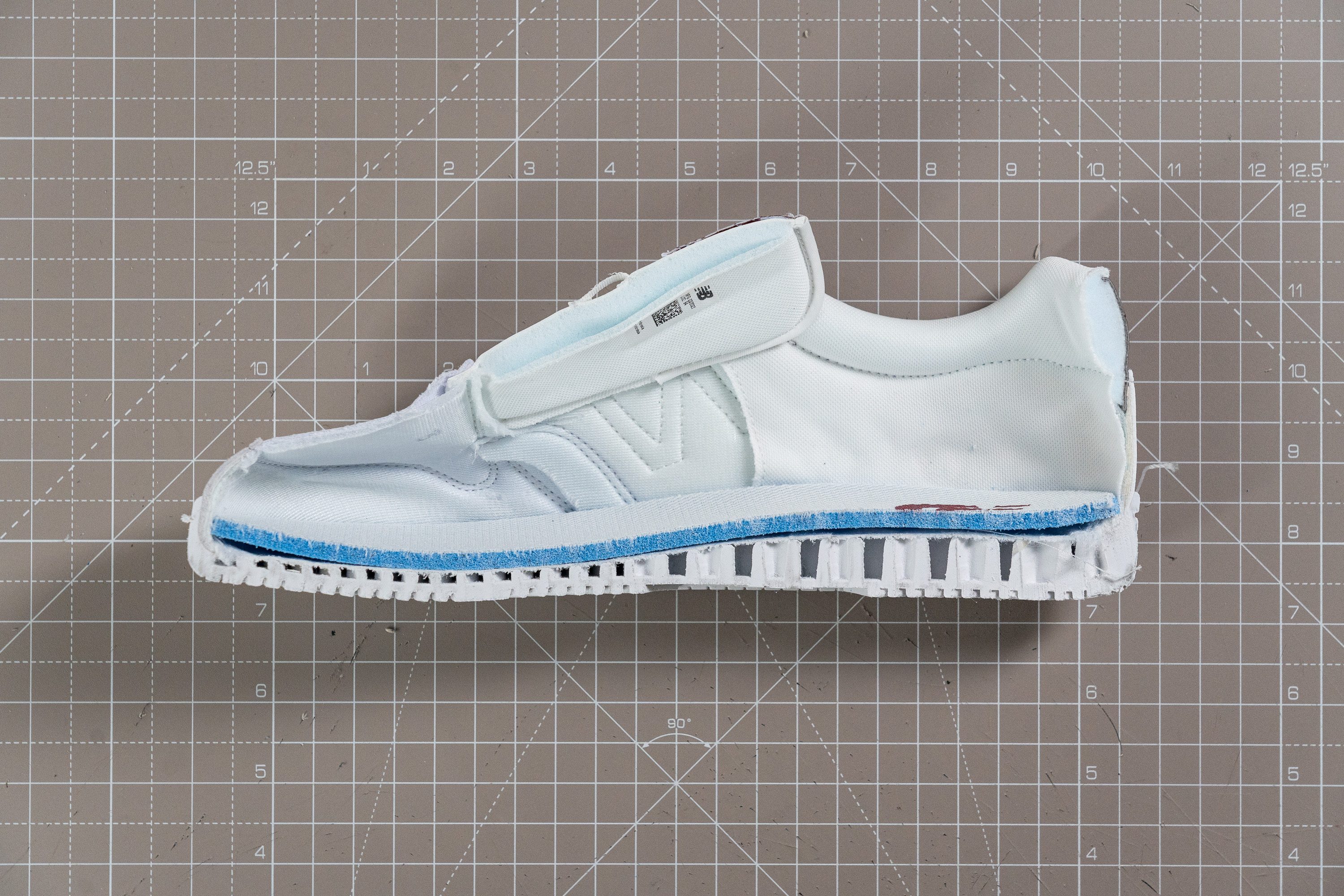
There is no right or wrong with drop heights when it comes to sneakers, only a matter of preference. While some are used to having an elevated heel to their shoes, others prefer the barefoot feeling of low or zero-drop shoes like those offered by Altra.
| 480 | 11.4 mm |
| Average | 11.2 mm |
Size and fit
Size
New Balance 480 fits true to size (61 votes).
Internal length
| 480 | 271.5 mm |
| Average | 272.3 mm |
Width / Fit
The slender tennis-shoe aesthetics of the New Balance 480 differs from most other NB sneakers. And this difference is also reflected is its internal space.
Having created a gel mold of the shoe's interiors, we measured its widest part at 87.4 mm. This is indeed a few solid millimeters narrower than average and could feel restricting even on a medium-width foot.
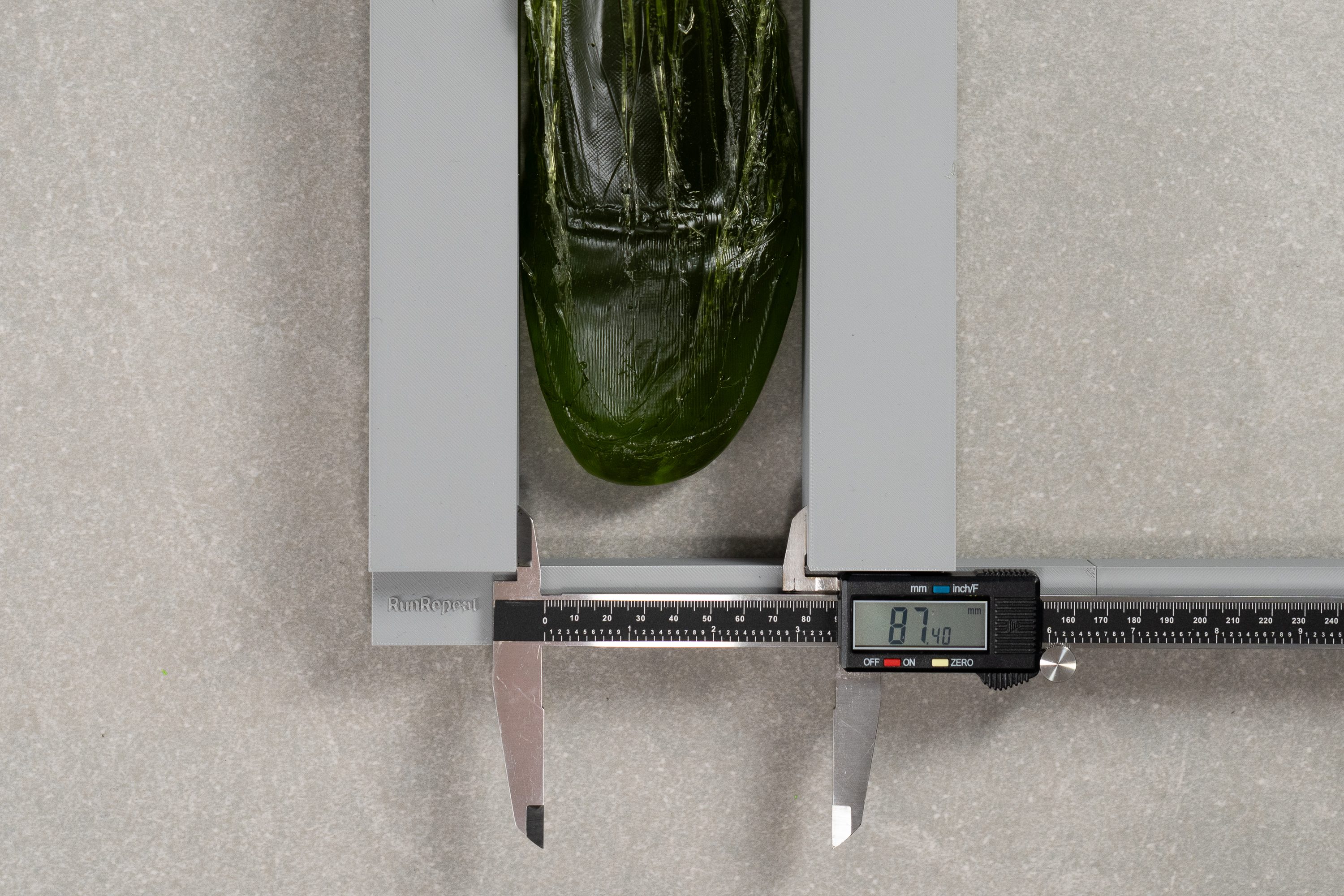
| 480 | 87.4 mm |
| Average | 92.5 mm |
Toebox width
The NB 480 turned out to be proportionally narrower at the big toe as well. Our caliper returned 66.8 mm in this area.
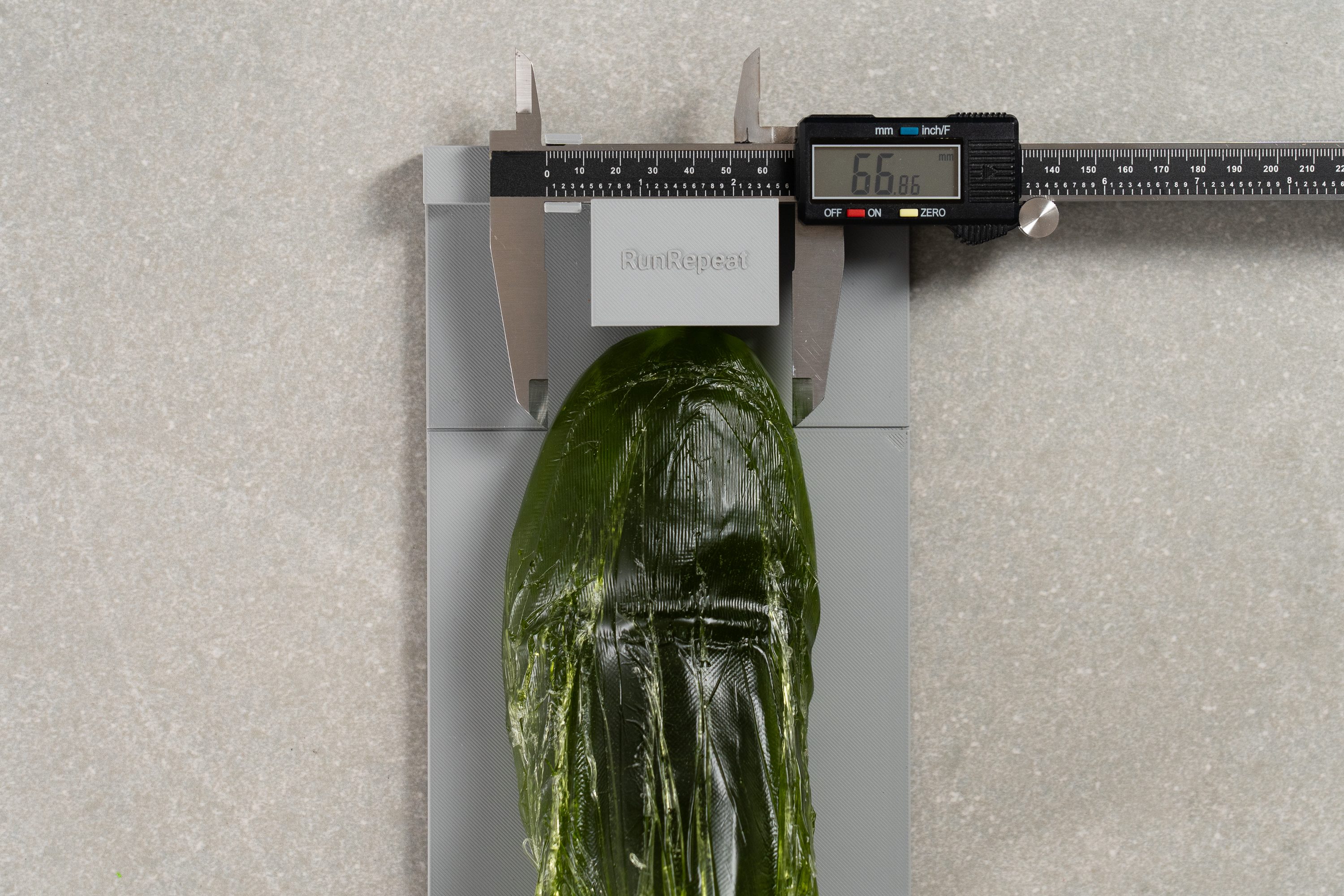
| 480 | 66.8 mm |
| Average | 68.9 mm |
Toebox height
On the other hand, we can't claim that it is a perfect sneaker for narrow feet because, paradoxically, it has a whopping toebox height of 34.2 mm!
If you want an equally minimal profile with a more predictiable fit, the Nike Court Vision Low and the Adidas Stan Smith would be a safer bet, in our opinion.
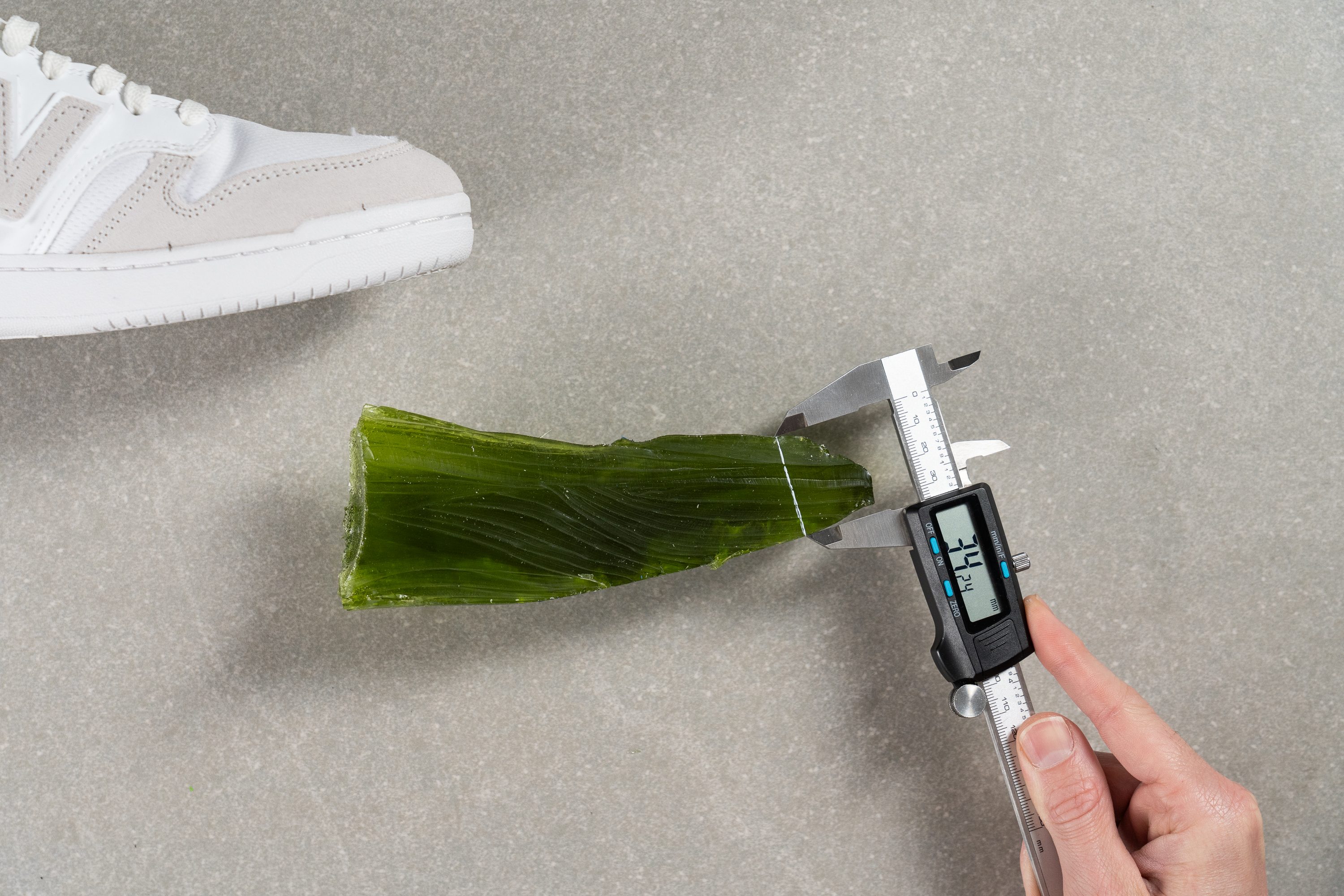
| 480 | 34.2 mm |
| Average | 27.8 mm |
Traction / Grip
Traction test
We didn't expect much traction from the shoe's recessed treading (which is cut into the sole as opposed to protruding outward) but it turned out to be a pleasant surprise.
Slashing the 480's heel against wet concrete at a 7-degree angle, our grip testing machine recorded an above-average friction score of 0.47. This implies excellent bite on both dry and wet surfaces, from concrete plazas to paving stones. However, we would still be cautious on extra-slippery surfaces like wet and polished tiles.
| 480 | 0.47 |
| Average | 0.43 |
Outsole design
The New Balance 480 shows off its basketball shoe past with a smooth retro court outsole and a pivot point.
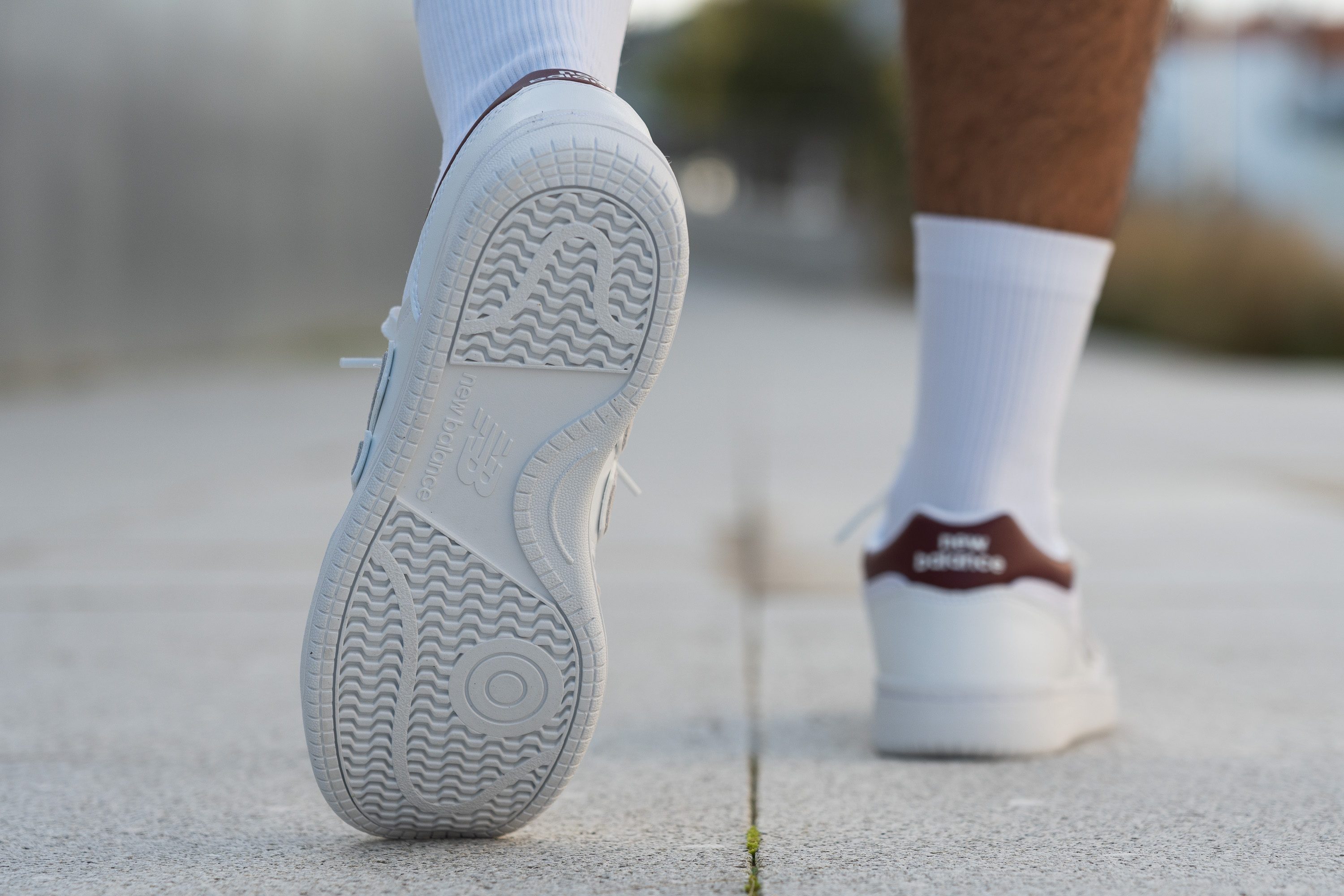
Flexibility / Stiffness
We secured the 480 in our shoe flexing tester to measure the amount of force needed to bend it by 30 degrees. The machine returned a lower reading of 11.1N, making it more flexible than our current lab average.
This level of flexibility means that the 480 is able to bend along with our foot with ease throughout our stride and greatly contributes to the comfortable nature of this shoe. As a result, it’s definitely forgiving enough on the foot for all-day use.
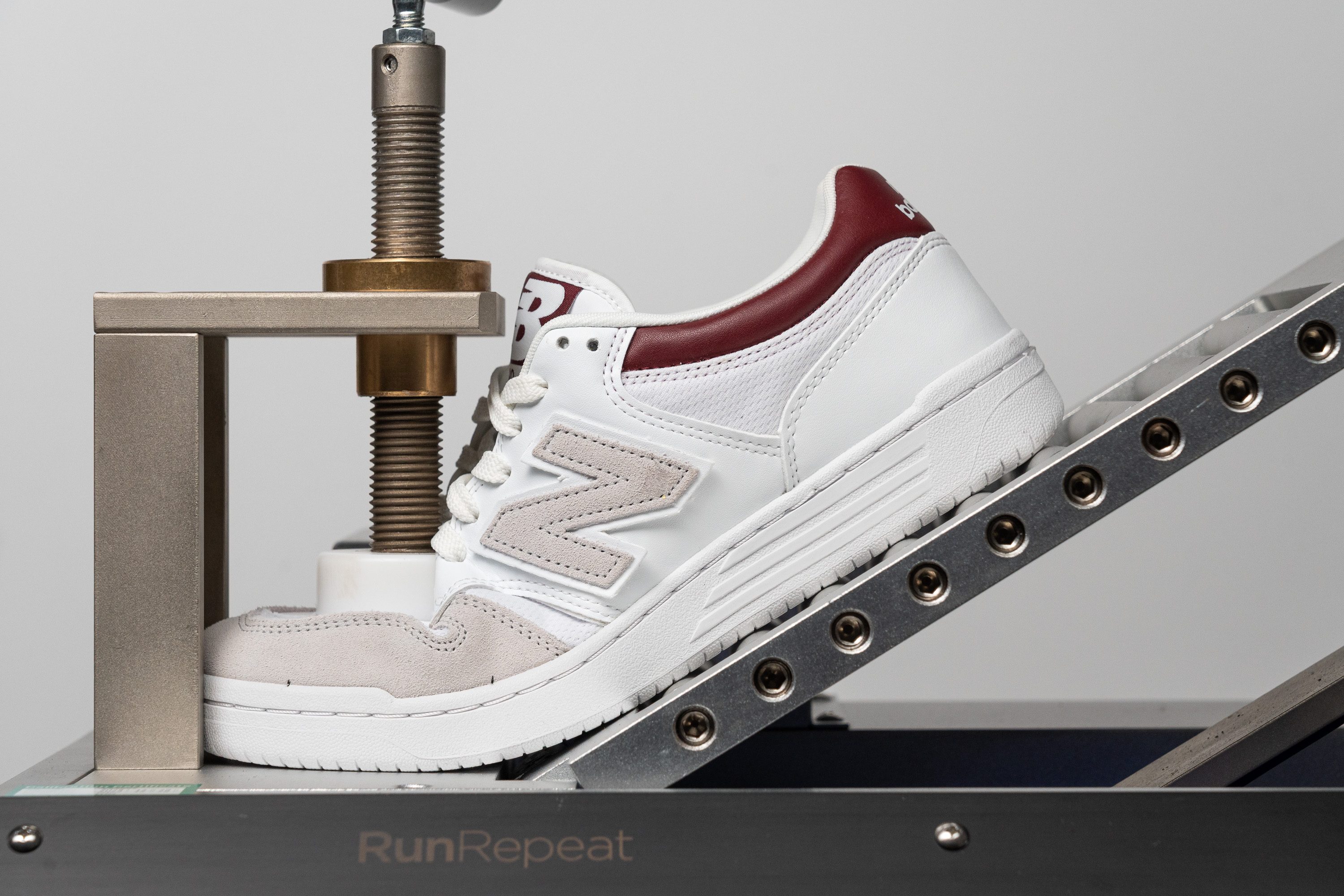
| 480 | 11.1N |
| Average | 13.3N |
Weight
While the 480 does sport a chunky old-school look, we found that it actually feels quite light and easy on the foot and never weighed us down as we moseyed around.
This is confirmed on the scale with the 480 coming in ever-so-slightly lighter than the average sneaker at 14 oz (395g). We wouldn’t call it a barely-there shoe, but it certainly doesn’t need a diet.
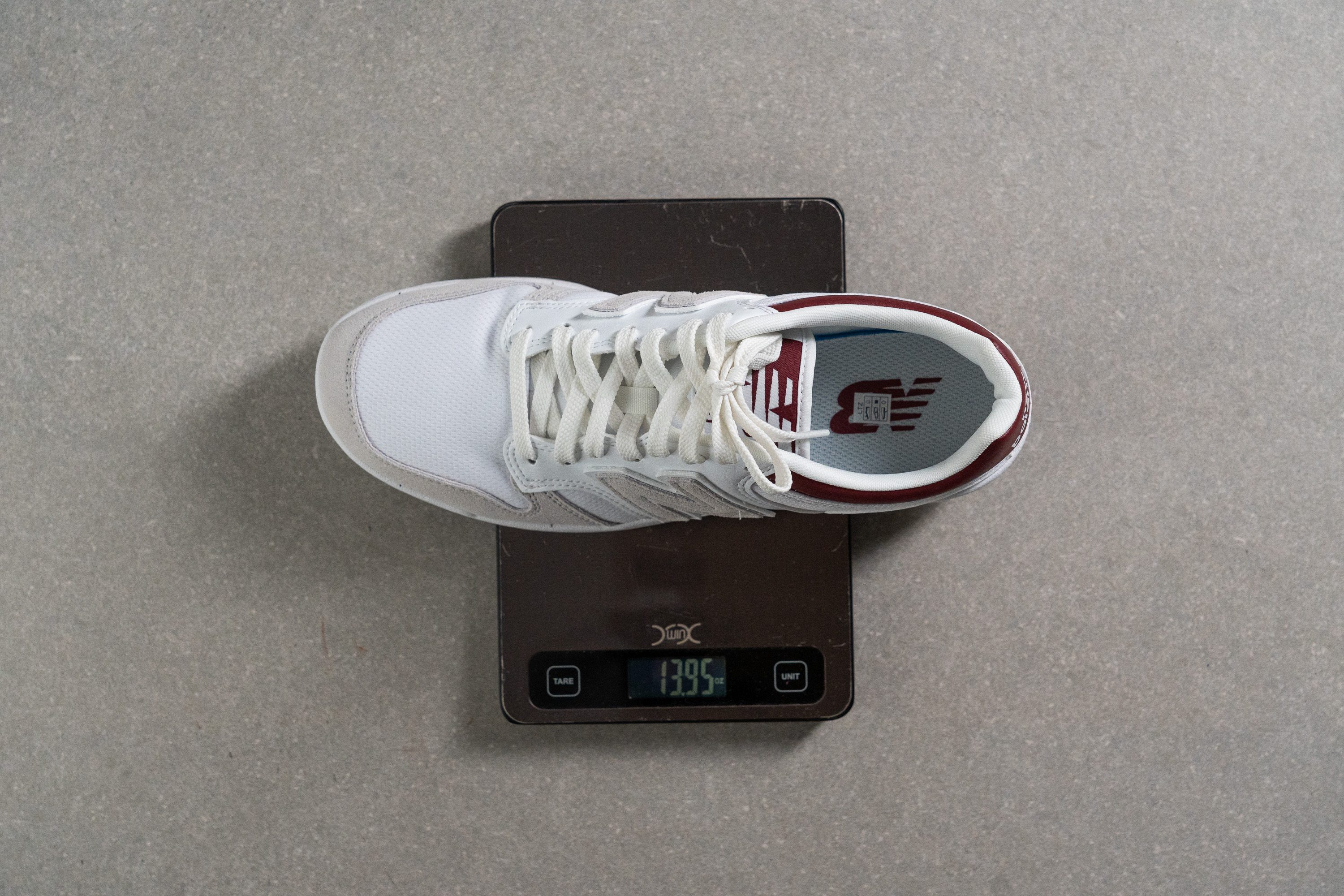
| 480 | 13.9 oz (395g) |
| Average | 13.8 oz (390g) |
Breathability
To test the breathability of the 480, we pump the shoe full of smoke to get a visual idea of how well-ventilated it is. Leather shoes (even fake leather) generally don’t fare too well in this test however, thanks to the mesh portion of the toebox and perforated tongue, we can see a slow but steady stream of wispy smoke emanating from the shoe. While somewhat better than expected, this run-of-the-mill performance leads us to give the 480 a middle-of-the-road breathability score of 3 out of 5. This means that the shoe should be comfortable enough to wear all year round, except on exceptionally hot days when it might feel a little toasty.
When examining a backlit cross-section of the 480, we can clearly see that the only parts of the shoe that allow any light to shine through are the unreinforced mesh portions of the upper.
Inspecting the mesh portion of the toebox under our microscope, we can see that it is made of braided fibers that form a pattern to reveal a less dense underlayer of mesh, all with lots of gaps that promote good airflow through the shoe. Without this section, the 480 would definitely be a toasty foot sauna of a shoe.
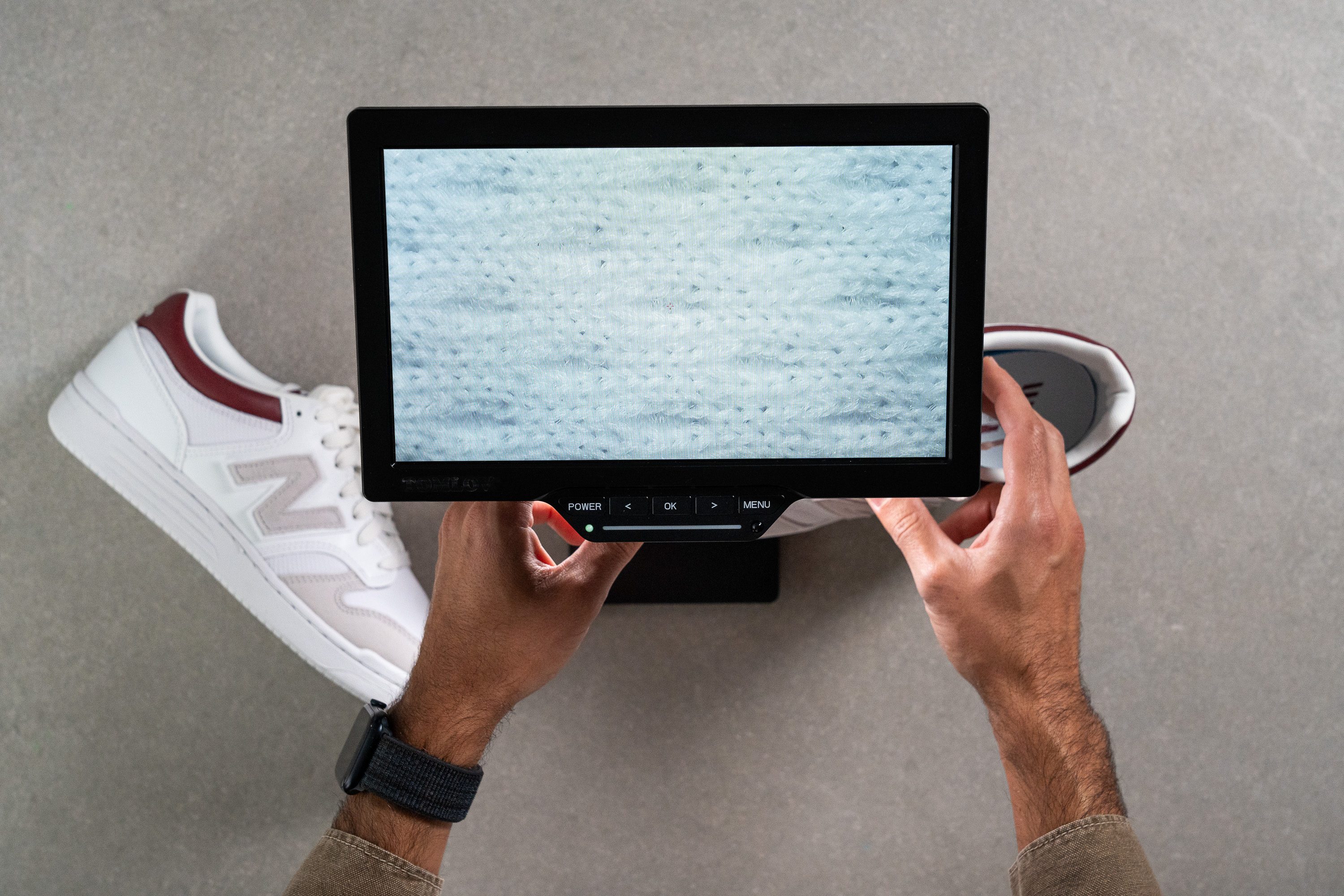
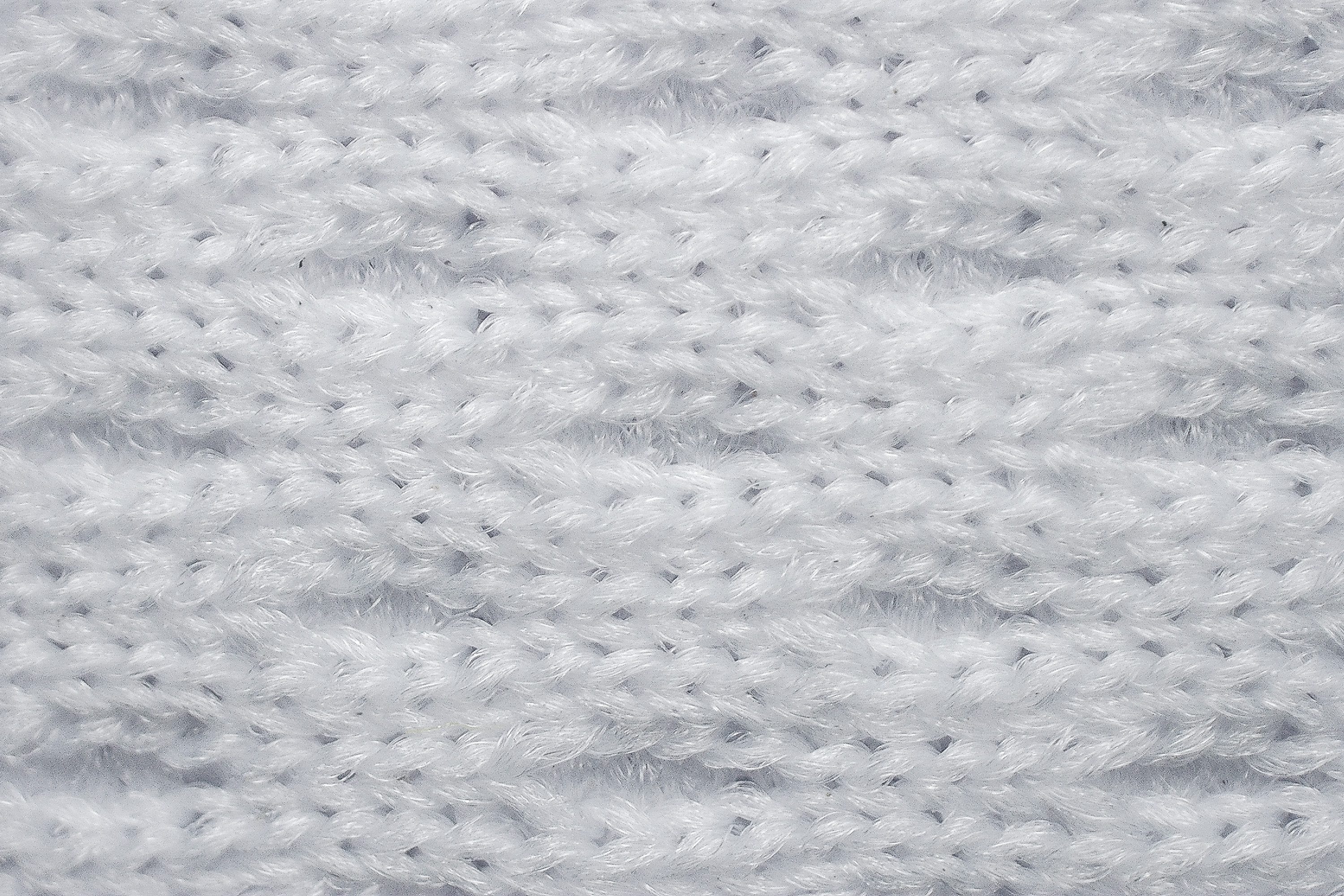
| 480 | 3 |
| Average | 3 |
Stability
Lateral stability test
Thanks to the shoe’s low profile, it’s no surprise that the 480 feels incredibly well-planted and stable as we shift our weight from side to side. Additionally, the well-structured leatherette upper provides an excellent foothold that feels incredibly supportive. As such, the shoe focuses more on delivering comfort rather than any rigid stability features.
Torsional rigidity
We were faced with less-than-average resistance as we bent and twisted the 480 in our hands, leading us to give it a torsional rigidity score of 2 out of 5 on our subjective scale.
This greatly contributes to the 480’s comfy and natural feel underfoot as the shoe is able to conform with the natural contortions of our foot throughout our stride with relative ease.
| 480 | 2 |
| Average | 3.6 |
Heel counter stiffness
We found the 480’s heel counter to be similarly pliable as we probed at it, earning it another score of 2 out of 5. This allows us to achieve a secure lockdown that doesn’t put too much pressure on our heels or tendons, making the shoe a great choice for those with sensitivities in those areas.
| 480 | 2 |
| Average | 3.2 |
Midsole width - forefoot
Using our caliper, we measured the 480’s platform to be 103.8 mm wide at the forefoot. Despite this being slightly narrower than average, it’s still a broad enough base to keep us feeling stable throughout day-to-day use.
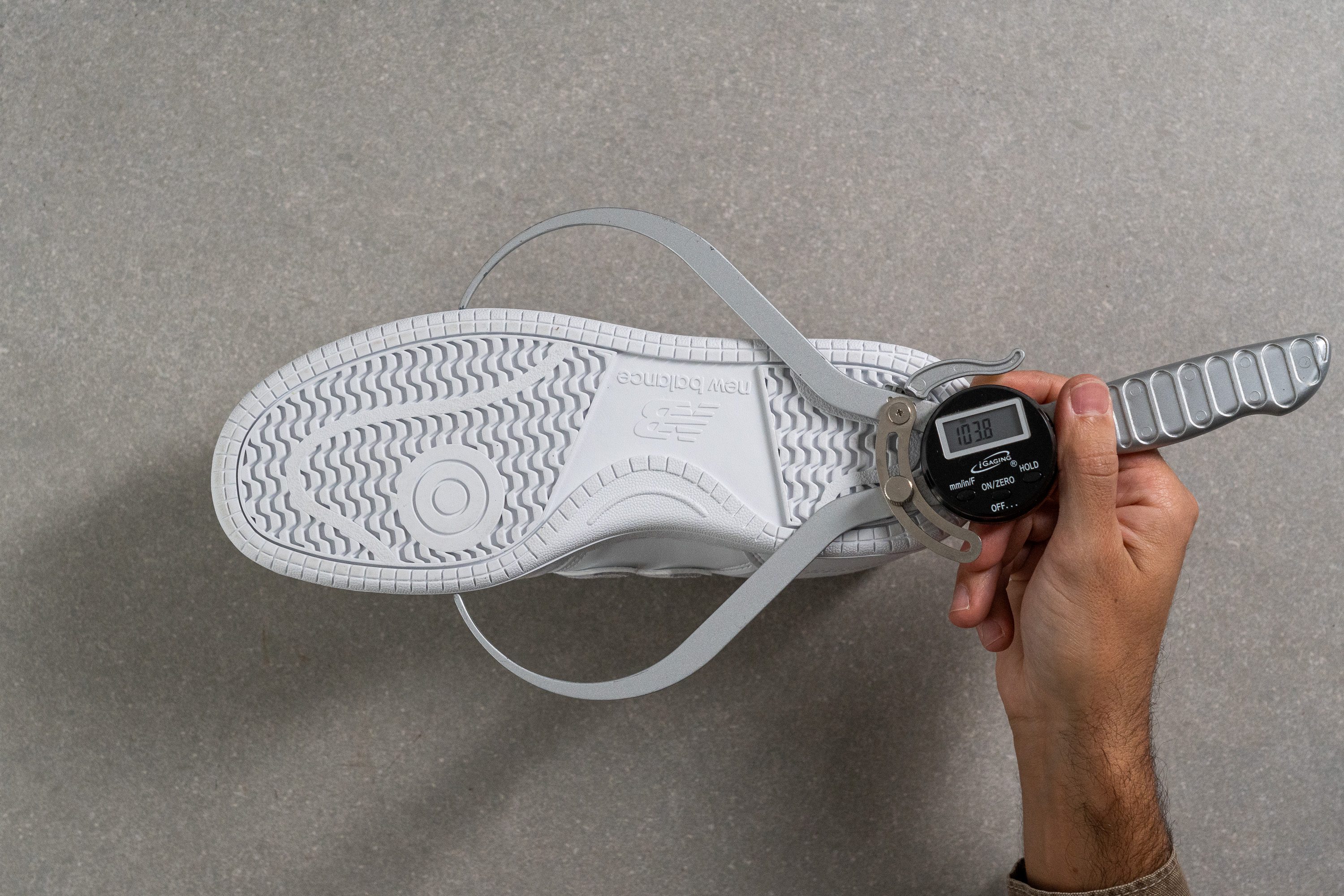
| 480 | 103.8 mm |
| Average | 108.9 mm |
Midsole width - heel
The 480’s platform is slightly wider than average at the heel, measuring 79.3 mm.
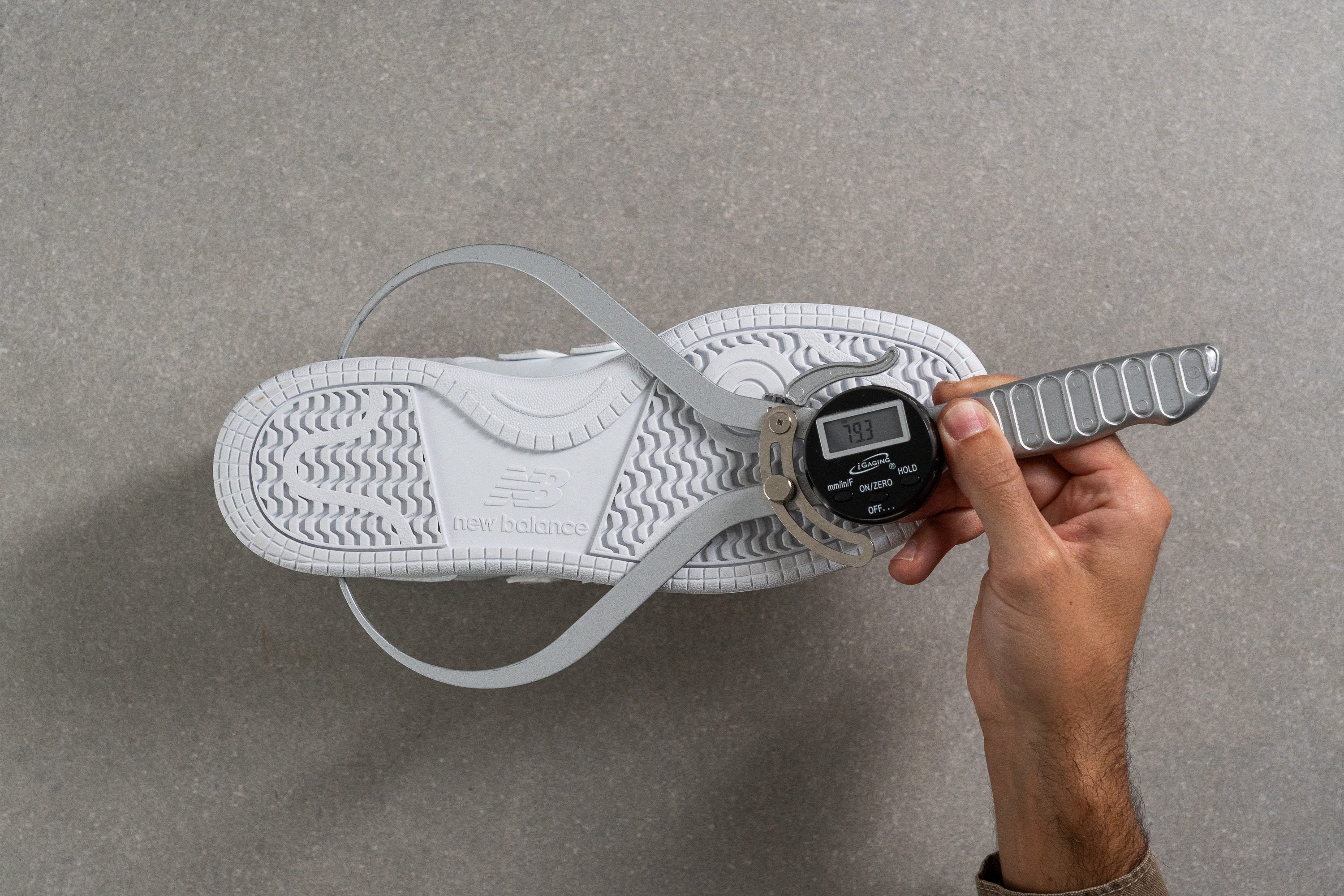
| 480 | 79.3 mm |
| Average | 84.0 mm |
Durability
Leather/Suede quality
Using our butane torch, we can confirm that the 480’s upper is made almost entirely out of synthetic materials. This is clear as the white sections of the shoe burst into flames and melt away from our awl when we scrape it. On the other hand, the suede overlays are the real McCoy, with the material only becoming scorched upon contact with the flame.
| 480 | Fake leather |
Toebox durability
We applied our Dremel to the unreinforced mesh section of the 480’s toebox to see just how durable it is. After withstanding 3.2N of grinding force spinning at 5K RPM for four seconds, the 480 was left with a massive and unsightly crater in its toebox.
However, since our tool didn’t manage to punch a hole clean through all the layers of material, we have to give the 480 a respectable 2 out of 5 for toebox durability.
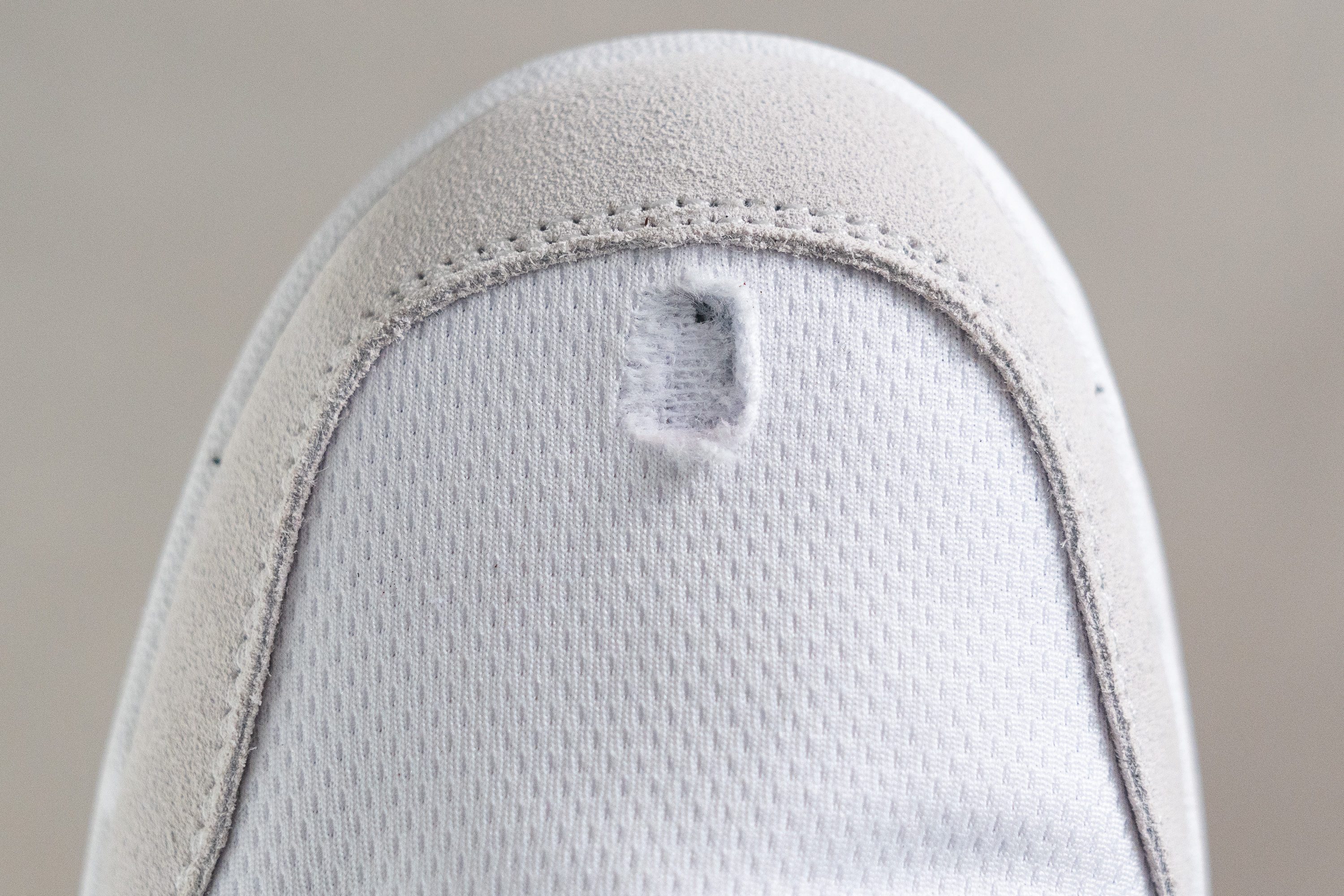
| 480 | 2 |
| Average | 3.7 |
Heel padding durability
Next, we turn our attention to the 480’s heel collar and unleash our merciless Dremel once more. The tool makes quick work of the lining material and starts flinging bits of padding material all over the place.
The white material makes it hard to visually assess the damage in the aftermath of the test, but we can confirm that the shoe had lost a good chunk of padding in those short four seconds. However, the generously padded collar still had some to spare, so this didn’t compromise the shoe’s rearfoot lockdown too much; thus earning it a durability score of 2 out of 5.
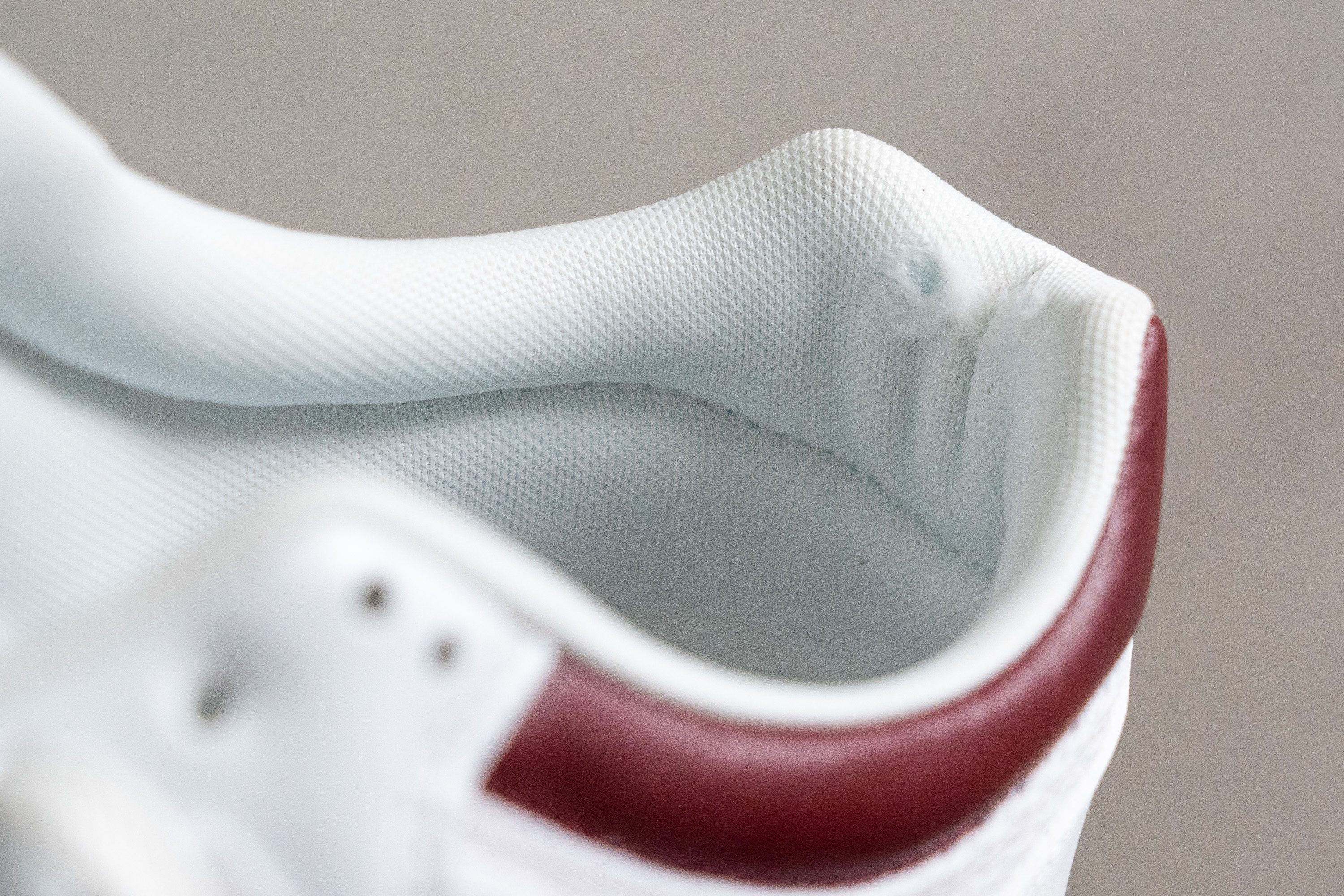
| 480 | 2 |
| Average | 3.2 |
Outsole hardness
With a durometer reading of 79.8 HC, the 480’s outsole is slightly softer than our current lab average. This means that the shoe should be soft enough to bite into and grip most surfaces with relative ease while still being hardy enough to withstand repeated impact and abrasions. We’ll be testing the latter with our Dremel in the next section.
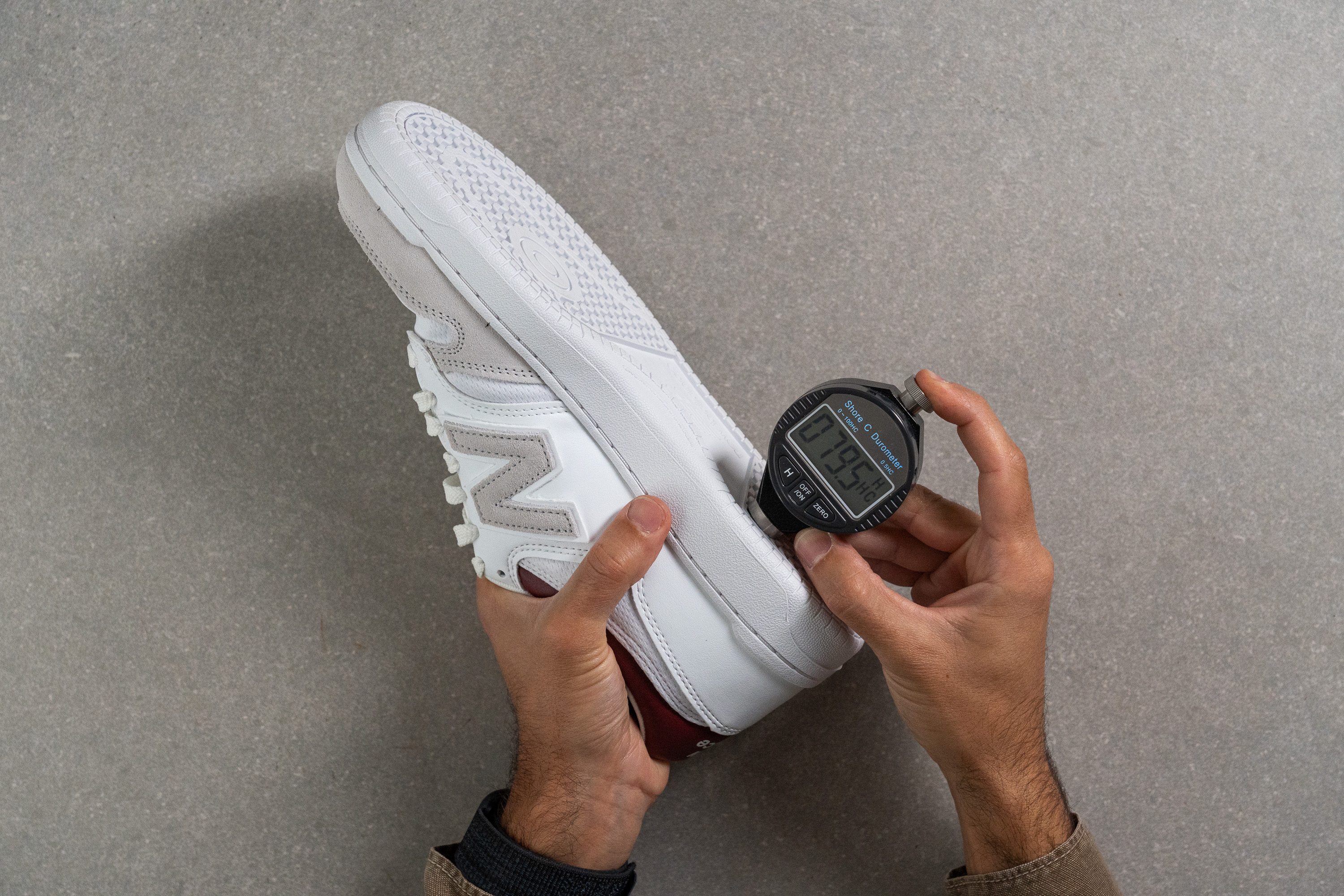
| 480 | 79.8 HC |
| Average | 85.7 HC |
Outsole durability
This time spinning at 10K RPM, we pressed our Dremel onto a section of the 480’s outsole and immediately kicked up a virtual snowstorm of debris.
Once the dust had settled after the twenty-second, we measured the damage with our tire tread gauge and found that only 0.94 mm of material was lost. This is better than the average sneaker performs in this test and means that we don’t expect to see any major wear and tear within the first 400 to 500 miles of normal use.
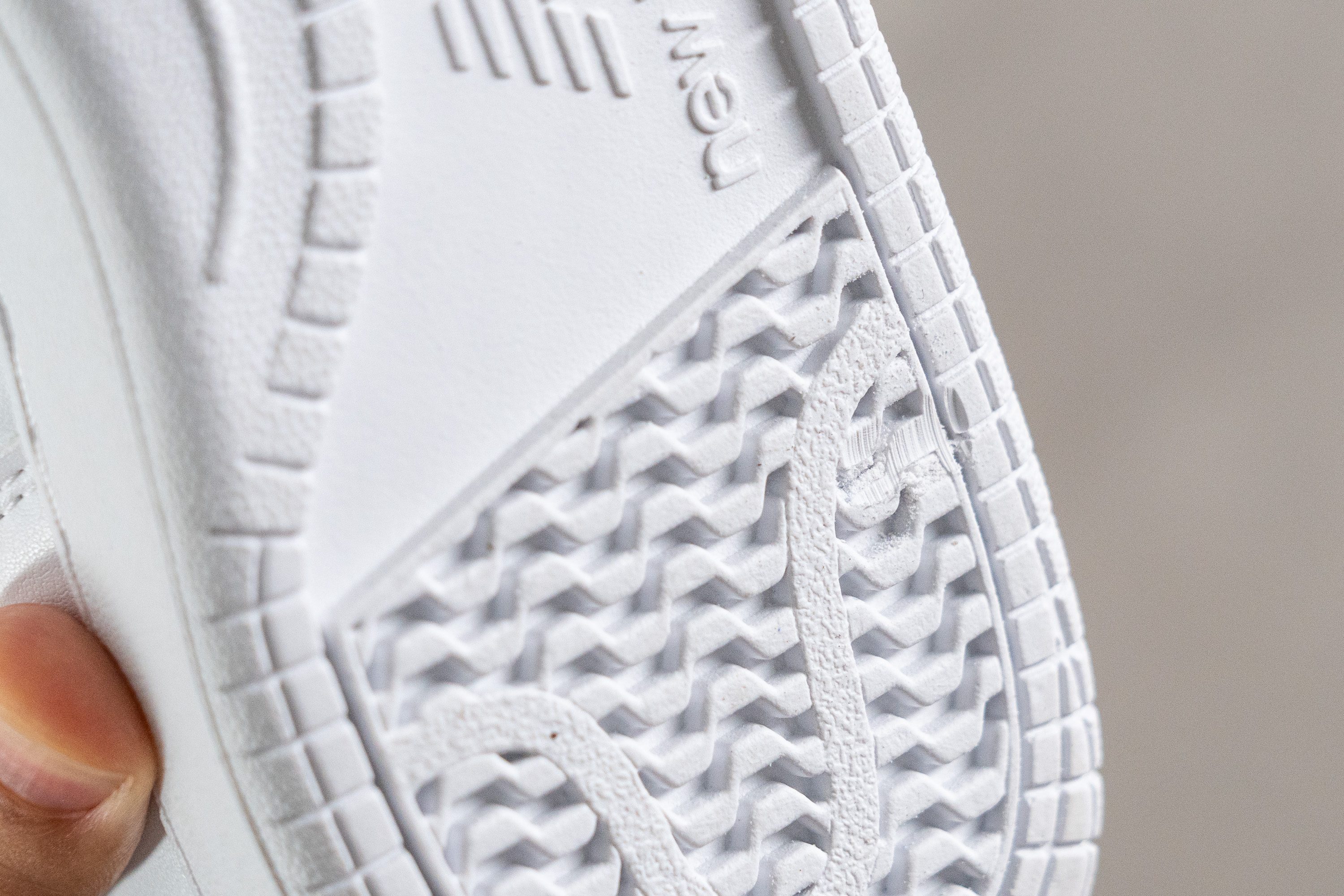
| 480 | 0.9 mm |
| Average | 1.1 mm |
Outsole thickness
We used our caliper to measure the 480’s outsole up to the cutout sections and found it to be just shy of our current lab average at 5.2 mm thick. However, as our previous test demonstrates, this still gives us plenty of material to wear through before the shoe becomes unwearable.
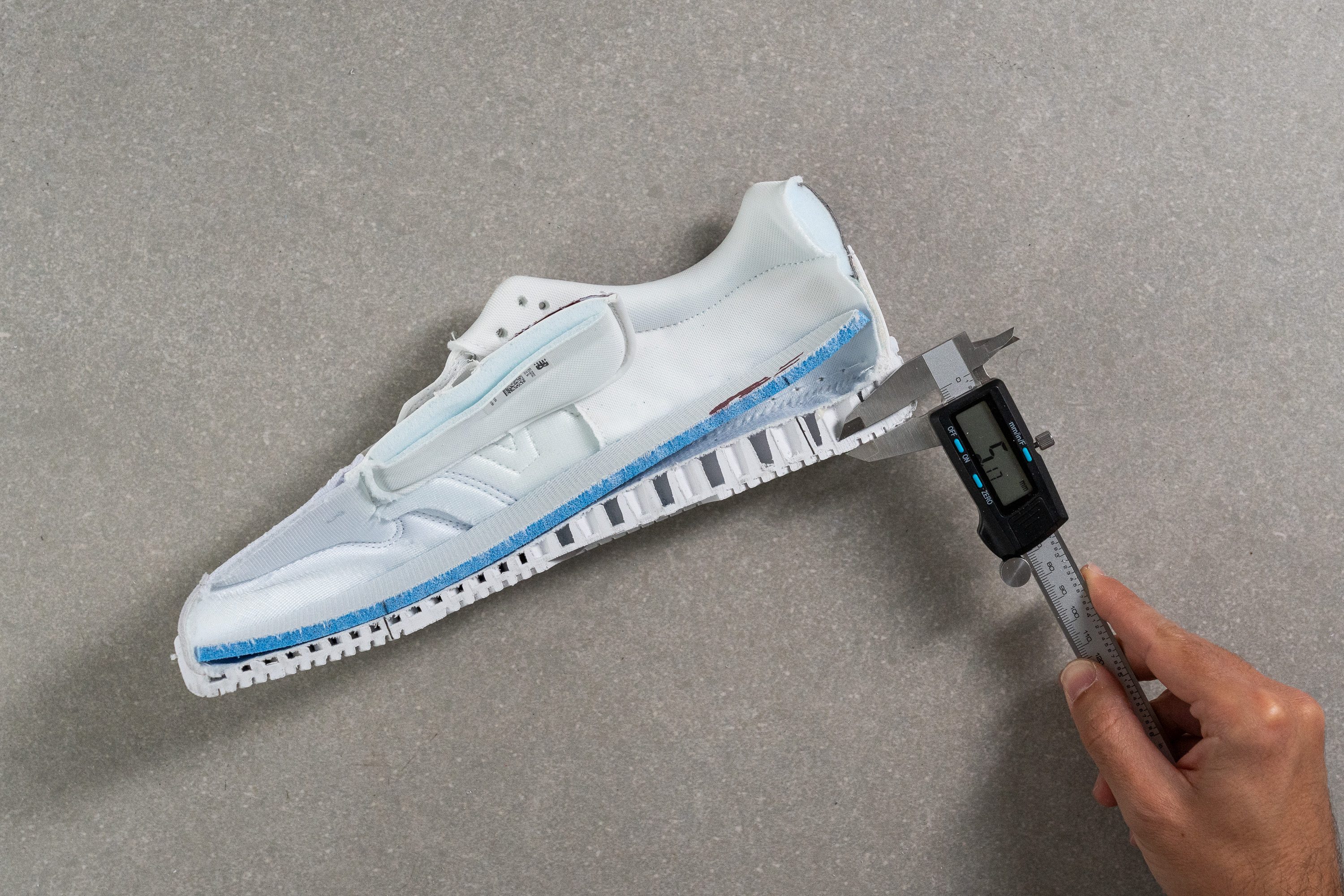
| 480 | 5.2 mm |
| Average | 5.3 mm |
Misc
Insole thickness
Despite being less padded than our current lab average at only 5.3 mm thick, the 480’s insole still provides a soft surface within the shoe that complements the cushioning quite well.
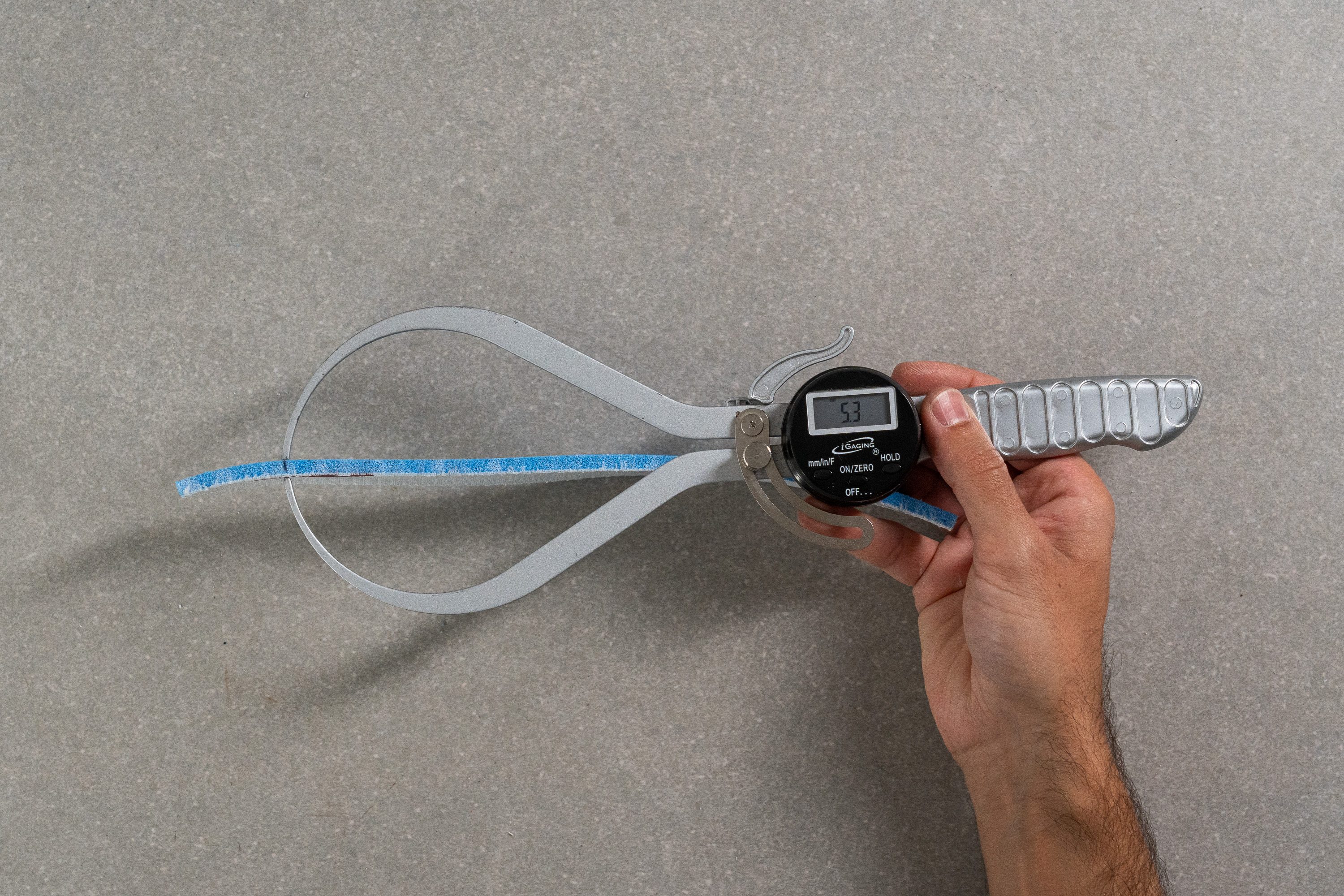
| 480 | 5.3 mm |
| Average | 5.1 mm |
Removable insole
The 480’s insole isn’t glued in, so those in need of added support in the form of custom orthotics can use them with this shoe.
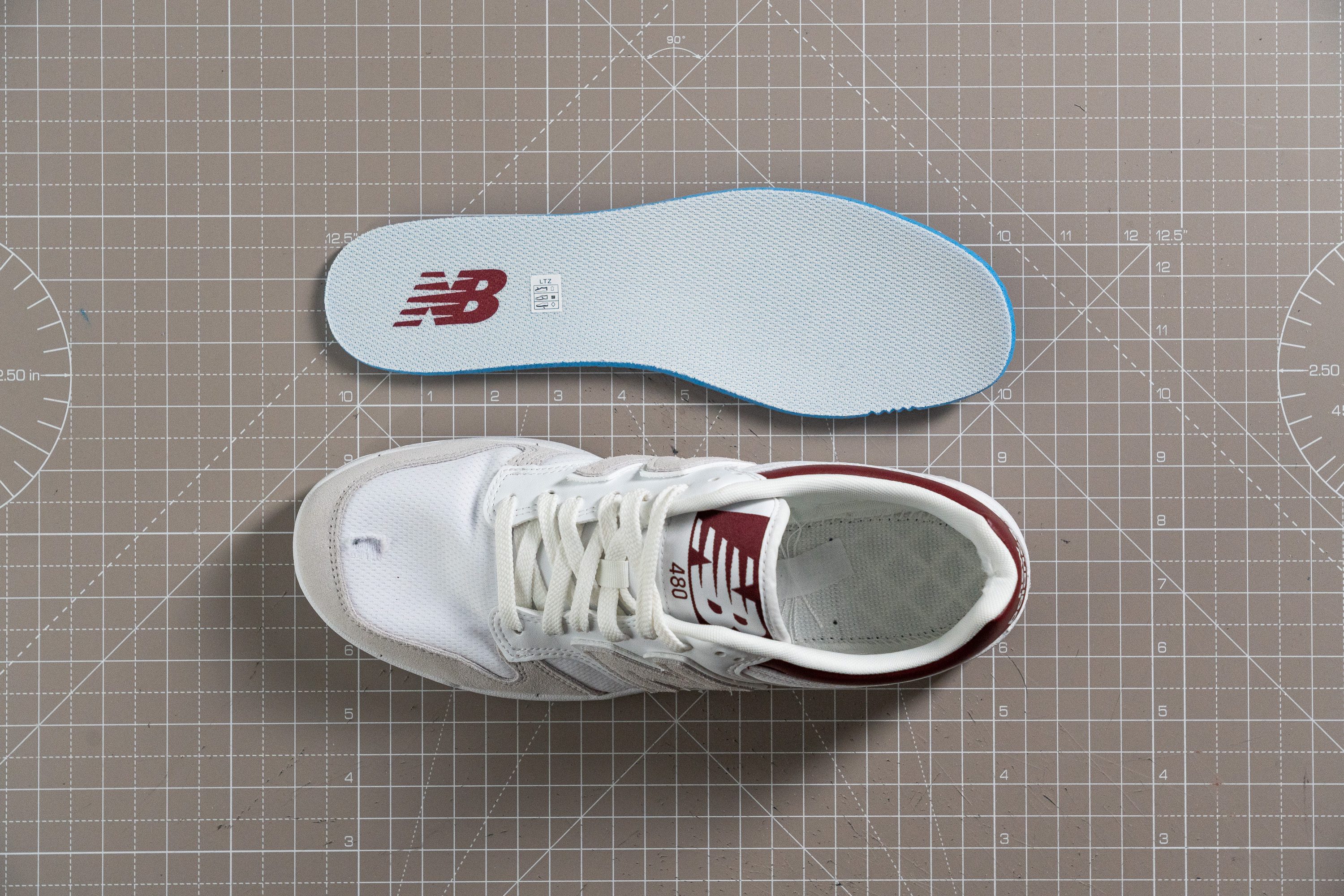
| 480 | Yes |
Reflective elements
The 480 doesn’t feature any reflective elements.
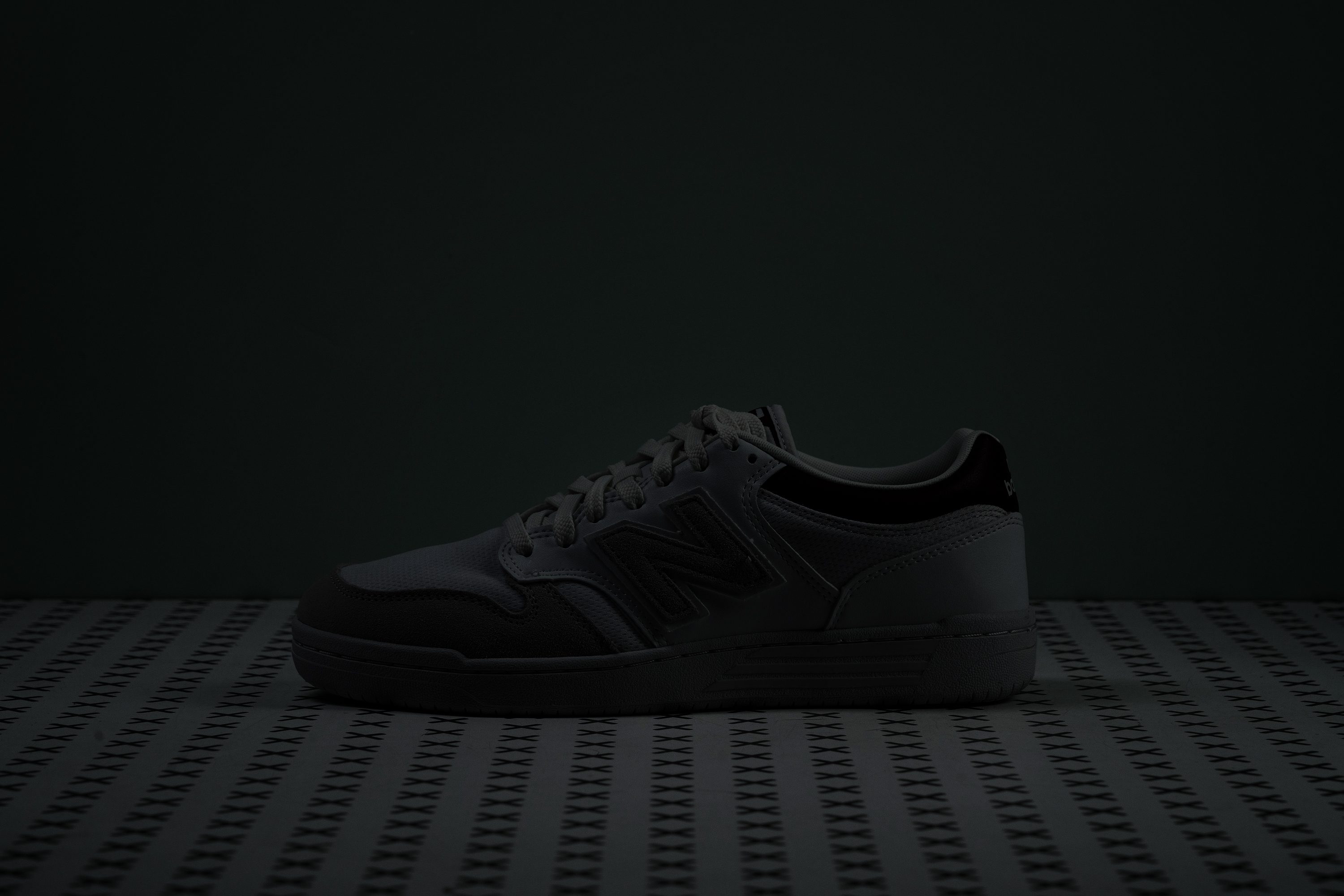
| 480 | No |
Tongue padding
At 8.8 mm thick according to our caliper measurements, the 480’s tongue is plumper than average. This allows us to lock the shoe in securely while still feeling extremely comfortable around the instep and without the faintest hint of lace bite.
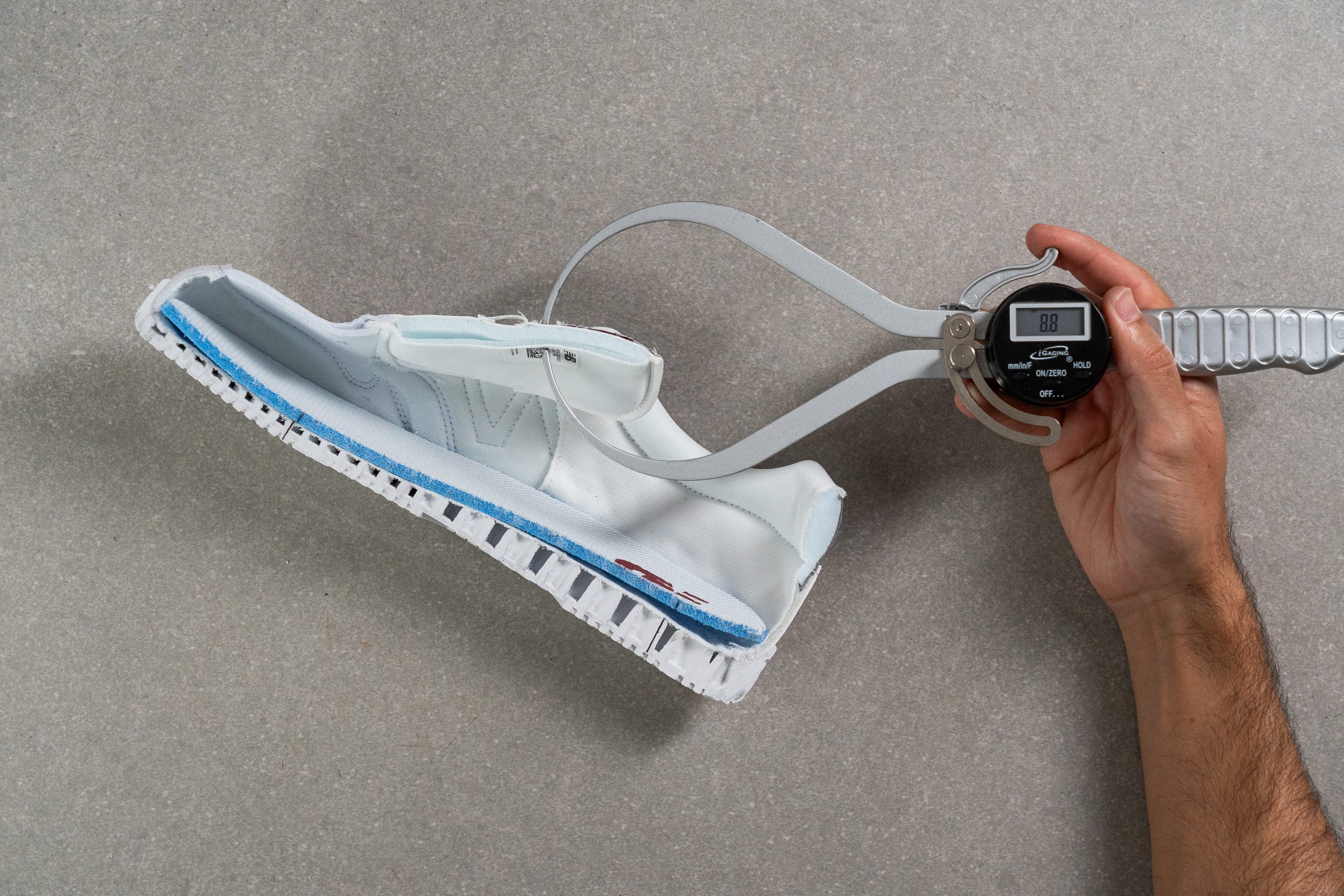
| 480 | 8.8 mm |
| Average | 9.6 mm |
Tongue: gusset type
The 480’s tongue is non-gusseted, though we didn’t face any issues with slippage thanks to its width and how generously padded it is.
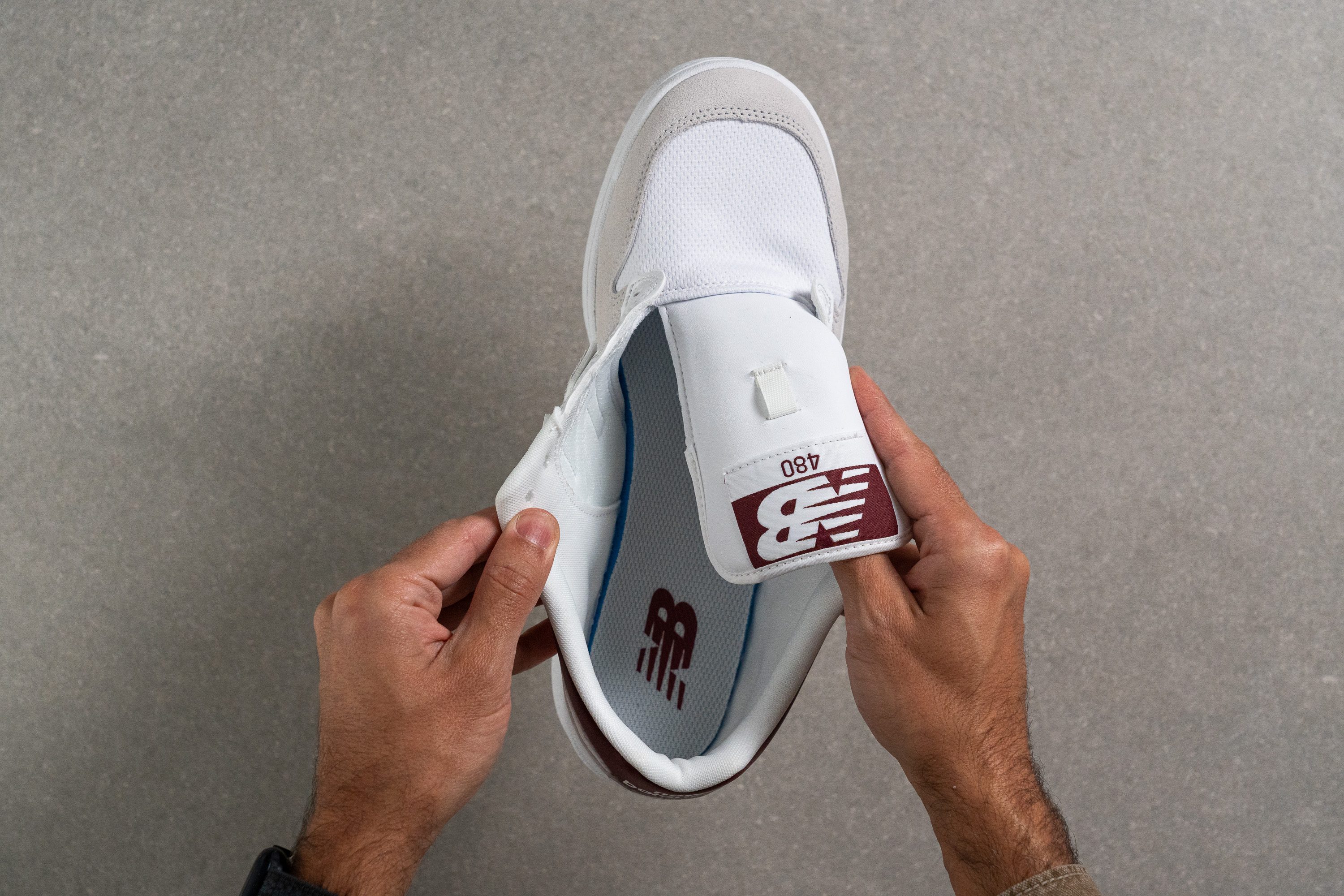
| 480 | None |

